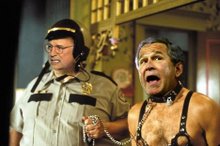First They Came For The Terrorists...
First They Came For The Terrorists...: "First They Came For The Terrorists...
by Thom Hartmann
The Gonzales confirmation is not just about the torture memos. It's much bigger than that.
If Bush continues to roll back human and civil rights - and the installation of Alberto Gonzalez as America's chief law enforcement officer is very much a part of his campaign to do so - we may be facing a 'Pastor Niem�ller moment' sooner than most of us could have imagined.
Tuesday, January 10, 2005, is the third anniversary of the opening of America's first concentration camp since Japanese Americans were shamefully interred during WWII. Since the first Guantanamo camp was opened, the Bush administration has built additional concentration camps - the latest known as Camp Five - in Cuba, and is asking Congress for $29 million to build concentration Camp Six.
These concentration camps detain uncharged, untried, unconvicted individuals, who may be held for the rest of their lives because, as the UK's Guardian newspaper noted on January 5th of this year, the Bush administration 'lacks proof' that they are either criminals or POWs.
This is one of the more visible parts of a much larger campaign the Bush administration has embarked on to reverse not only 229 years of the American rule of law regarding the rights of average citizens, but nearly eight centuries of human rights that go back to an epic moment in 1215 on a meadow by the River Thames.
The modern institution of civil and human rights, and particularly the writ of habeas corpus, began in June of 1215 when King John was forced by the feudal lords to sign the Magna Carta at Runnymede. Although that document mostly protected 'freemen' - what were then known as feudal lords or barons, and today known as CEOs and millionaires - rather than the average person, it initiated a series of events that echo to this day.
Two of the most critical parts of the Magna Carta were articles 38 and 39, which established the founation for what is now known as "habeas corpus" laws (literally, "produce the body" from the Latin - meaning, broadly, "let this person go free"), as well as the Fourth through Eighth Amendments of our Constitution and hundreds of other federal and state due process provisions.
Articles 38 and 39 of the Magna Carta said:
"38 In future no official shall place a man on trial upon his own unsupported statement, without producing credible witnesses to the truth of it.
"39 No free man shall be seized or imprisoned, or stripped of his rights or possessions, or outlawed or exiled, or deprived of his standing in any other way, nor will we proceed with force against him, or send others to do so, except by the lawful judgment of his equals or by the law of the land."
This was radical stuff, and over the next four hundred years average people increasingly wanted for themselves these same protections from the abuse of the power of government or great wealth. But from 1215 to 1628, outside of the privileges enjoyed by the feudal lords, the average person could be arrested and imprisoned at the whim of the king with no recourse to the courts.
Then, in 1627, King Charles I overstepped, and the people snapped."
continued......

No comments:
Post a Comment